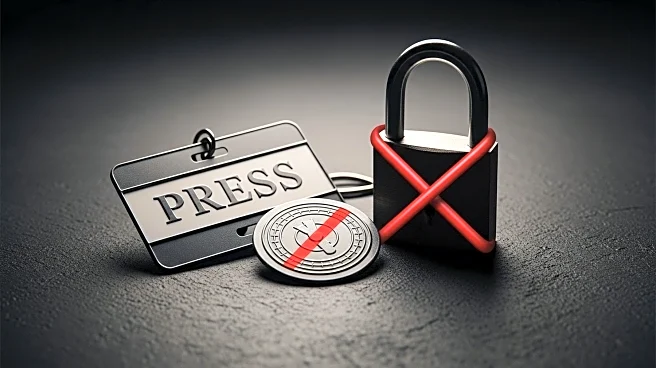What's Happening?
The Trump administration has introduced a new policy at the Pentagon requiring journalists to pledge not to gather any unauthorized information, even if it is unclassified. This policy allows the Pentagon to revoke press credentials for those deemed a security threat or in possession of unauthorized information. Defense Secretary Pete Hegseth has been tightening restrictions on Pentagon reporters, limiting their access and communication with military personnel. The new policy mandates that media sign agreements restricting their movement within the Pentagon and prohibits them from obtaining unauthorized material. Journalists who refuse to comply will lose their credentials. This move is part of a broader effort by the Trump administration to control press access to government institutions.
Why It's Important?
The new restrictions on journalists at the Pentagon represent a significant shift in the relationship between the press and the military. By limiting journalists' ability to gather information, the policy could undermine press freedom and the public's right to know about military operations and decisions. Critics argue that this policy is part of a broader assault on free speech and press freedom by the Trump administration. The National Press Club has condemned the decision, warning that it could lead to government-controlled reporting. This development could have far-reaching implications for transparency and accountability in government, affecting how the public receives information about national security and defense matters.
What's Next?
The implementation of this policy may lead to legal challenges from media organizations and press freedom advocates. There could be increased scrutiny and debate over the balance between national security and press freedom. Journalists and media outlets may seek alternative ways to report on Pentagon activities, potentially leading to increased tension between the press and the government. The policy's impact on the quality and independence of reporting on military affairs will likely be closely monitored by both domestic and international observers.
Beyond the Headlines
The policy raises ethical concerns about the role of journalists in a democratic society and the potential for government overreach in controlling information. It also highlights the challenges faced by journalists in maintaining independence and objectivity in an increasingly restrictive environment. The long-term effects of such policies could lead to a chilling effect on investigative journalism and a reduction in the diversity of perspectives available to the public.









